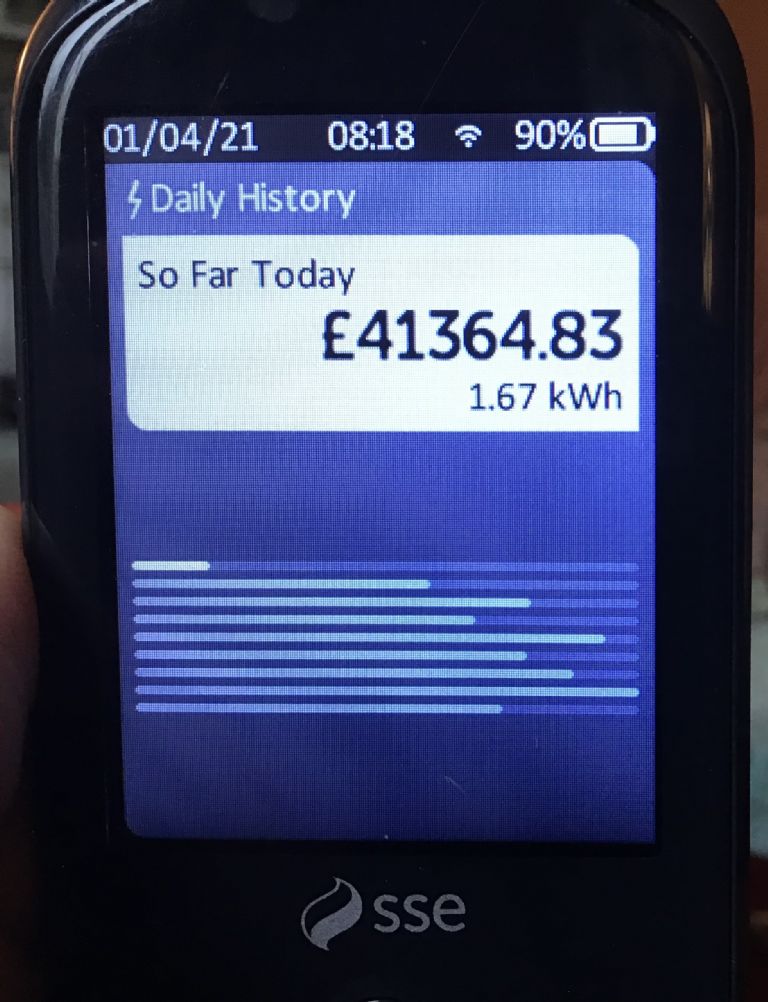Posted by RMA on 01/04/2021 10:07:33:
…
The decision to go down this route, with unattainable deadlines was made by 'not so smart' politicians. If anyone can give me a sound reason for the consumer having one, I'd be pleased to hear it.
…
I'd agree with politicians being 'not so smart', and not realising suppliers would roll-out incompatible smart meters is an example! Never good at detail, the politicians assumed meters were meters, and that one would be good for all. It was of course a glorious opportunity for Utility Companies to extract more money from governments!
We happen to have lived in a world where energy was available on demand, and customers could consume it as he liked. This happy state of affairs is coming to an end. Oil, gas and coal are within 60 years of failing and the cost of energy from those sources is going to rise sharply over the next 15 years or so. Fossil fuels are being replaced by Green Energy, which are cheap and sustainable, but not necessarily available on demand. This means the cost of energy will vary with demand, and if demand exceeds supply, the whole system might fail.
At the moment, individuals with cash are free to consume energy whenever they want, but this can't be supported in future. Smart Meters are one way of damping out supply and demand problems. They make it possible for:
- Consumers to be charged at the going rate minute by minute. Thus, Mrs NDIY can cook whenever she wants, but the meter will tell her (or Mr NDIY), that the power is being charged at peak rate. Conversely, at other times power will be dirt cheap, and the meter will show that. It's only partly about saving by identify greedy devices, smart meters encourage people to use power when it's plentiful, and discourage them when it's short. We might choose to eat when power is cheap, not at fixed times.
- Power can be switched on or off house by house, rather than area by area. Also possible in future for devices within a home to be prioritised so that heating and cooking work, but not inessentials like vacuum cleaners and hobby workshops. Grid overloads are managed crudely at the moment, as demonstrated recently in Texas, but Smart Meters add finesse. An area could be disconnected apart from hospitals and old-age pensioners, or made even more fine-grained.
- Selfish behaviour makes shortages much more painful. For example, the Texas crisis was made much worse by people turning everything on when power was available to grab what they could before it failed again, which it did because the community was drawing more power than normal. Smart meters have the potential to limit wild swings in demand during shortages. 'Disconnect all homes consuming more than 20A'
Always tension between personal freedom and the needs of the community, but in this case it appears Smart Meters are part of the answer to a new problem. When, where, and how electricity is produced is changing fundamentally, and we have to adapt. I like the idea that my car could be set to recharge slowly only when power is cheap, but could choose to charge it fast at any time by paying more money, but I would have to know how much it cost before pressing the override button. Smart meters can do that. In practice, I think millions of people managing their consumption according to cost will match supply and demand effectively, so that those who need power during shortages still get it without smart meters actually having to disconnect anybody. Time will tell.
Dave
Andrew Tinsley.


 .
.
 in the early 2000's. Their main source of power is Hydro Electric and successive drought years had significantly reduced capacity. All households were required to reduce consumption by 20% compared to the same period the previous year. Penal rates would be charged for any excess and disconnection threatened.
in the early 2000's. Their main source of power is Hydro Electric and successive drought years had significantly reduced capacity. All households were required to reduce consumption by 20% compared to the same period the previous year. Penal rates would be charged for any excess and disconnection threatened.

